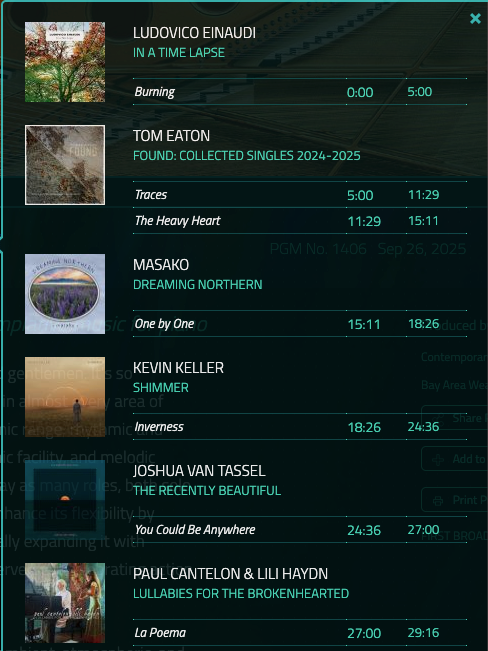
RECENT POSTS

February 13, 2024
July 2021: Don't Ever Change, or, I Like You Just The Way You Are
"A foolish consistency is the hobgoblin of little minds, adored by little statesmen and philosophers and divines" – Emerson
What is change, exactly? I mean, given that time is moving right along, isn’t it impossible for anything to be the thing it was a moment ago?
Let me back up… or at least get more specific.
A lot of the music I make has, either buried in it or overtly displayed, what Emerson might call foolish consistency. A single tone lingering through an entire piece (see "Vervagen" from my Indesterren album) is undeniably unchanging, and yet what surrounds that tone is always changing.
Intertwining long loops of slightly random events (see "The Marsh and the Tide" from my Elements: Earth album) can feel both consistent and variable, like ocean waves or crickets chirping. The sound is identifiably consistent, and yet with deeper inspection made of many singular events.
If familiarity breeds contempt, shouldn’t we hate music altogether? I mean, how many times can we hear "Sweet Dreams are Made of This…" and still happily sing along? Personally, I’m still counting. Maybe music gets a waiver on the whole foolish consistency thing just because it’s a time-based art form. I’ll have to check the rule book and consult the judges on that.
As a music listener, an occupation that predates any interest in making music, I was always drawn to albums that had a sonic consistency to them. Beyond just the familiarity of repetition, I hungered for records that created places I wanted to spend time in. When Harold Budd and Brian Eno made "The Pearl," they also created a world I never wanted to leave. Tim Story’s "Beguiled" is similar, as is David Sylvian’s "Gone to Earth."
I spent hours and days lost in those very consistent worlds. I grew addicted to the hover of tonality. My mind found real comfort in the reliability and availability of those sonic landscapes, in the same way my body embraces the air at the ocean. And eventually, I learned how to go there in my own music.
Part of it is stopping. Perhaps a large part of making patient music is stopping yourself before you’ve gone and filled up every foreground moment with a "Look at me!" event.
My process, at least when I’m availing myself of instruments beyond the piano, tends to start with the landscape. The part that will be revealed when the foreground rests. The landscape is the world the song will live in.
There’s a key and a feeling and some motion of some sort, but it’s the musical equivalent of wind and birdsong. Not just because silence is scary and unsettling, but because in nature (at least in my experience), there is no real silence. It takes only a minute in a quiet studio room before I can hear my own heartbeat… I’ve never been anywhere that quiet in the natural world humans inhabit.
People talk about "the space between the notes," but that space was never silence… John Cage summed that one up pretty well in 4:33.
Anyway, once the landscape is done, I can ask what happens in front of it. Last year, when I was making the "Elements" albums, the answer was "nothing!" Generally, though, something does happen. Ideas emerge out of the fog of the landscape and ask to be committed to tape, and I oblige them.
Let’s get back to the foolish consistency. As I write this, I’m listening to a Vangelis piece ("Twilight" from The City). I believe it’s a five-minute song that has been on repeat for at least a couple of hours, and I might listen to it for another hour or so just because it’s the space my day has been living in. The light in the room has come and gone as bands of rain have passed over the studio building. The cat has wandered in and out. But through it all, a high G, gently played on a string synth of some kind, has held things together.
I’m completely grateful for the constancy of the music, the consistency of its mood, and the way it changes my energy. The sound is my indoor ocean waves, my indoor soft breeze of place and time, and it serves to keep my brain from rattling around inside my head as the day winds to its end. This is why I make music.







